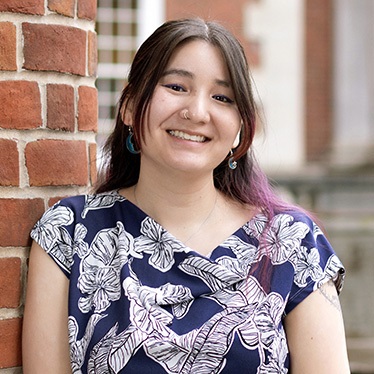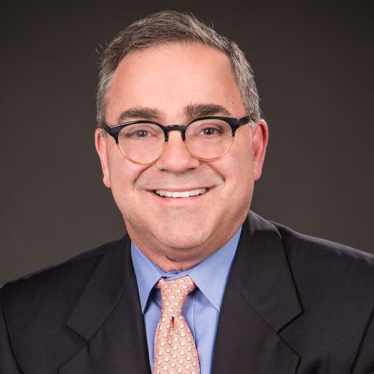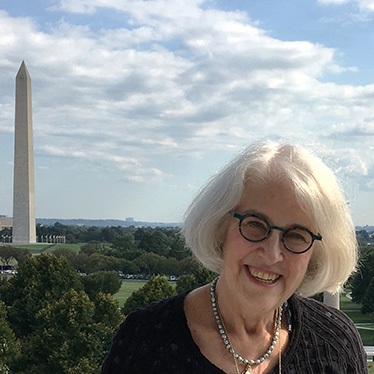What Ralph Ketcham Meant to Maxwell
January 1, 2018
 Howard Mansfield '79 BA (AmSt) was one of more than 7,000 Syracuse University students who sat in a Ralph Ketcham classroom during Ketcham's 66-year career. Mansfield was also among the most devoted. He stayed in touch with Ralph and his wife, Julia, visiting them, for example, at their summer home on Lake George.
Howard Mansfield '79 BA (AmSt) was one of more than 7,000 Syracuse University students who sat in a Ralph Ketcham classroom during Ketcham's 66-year career. Mansfield was also among the most devoted. He stayed in touch with Ralph and his wife, Julia, visiting them, for example, at their summer home on Lake George.
Mansfield discovered, on one such visit, that Ketcham had grown obsessed with why decades earlier — even at Maxwell — citizenship education fell out of favor. Ketcham was plumbing the history of the School's founding. He scoured political science literature, from the early 20th century through the late 1950s, when, in Mansfield's telling, "the rise of Darwinism had led political scientists to try and describe 'what is' rather than prescribe 'what should be.' It was a moral-neutral scientific approach."
Mansfield quotes Ketcham's response to the trend: "But no one is talking about the public good."
And, at Lake George, Julia offers a wry aside: "They look at him as if they had never heard the phrase."
Mansfield told that story on September 25, during a memorial service at Syracuse University. Ketcham had died the previous April, at the age of 89, and people were gathered to remember him and tally his impact. Talk returned, again and again, to Ketcham's life-long conviction that, in a democracy, citizens must prepare to contribute to their own governance. And talk returned to Ketcham's quiet but dogged crusade: helping the Maxwell School return (as it eventually did) to its trademark approach to citizenship education.
It is not all for which Ketcham is remembered. He was a peerless teacher, who engaged students as equals, gently luring them toward insights. "He didn't teach us what to think. He taught us how to think and did it so artfully that we felt we'd accomplished it on our own," wrote James Naughton '79 BA (AmSt) for Syracuse University Magazine in 1987. ". . . Professor Ketcham invited us to partake in his own constant questioning."
"What stood out about Ralph," said William Polf '71 MA (Hist)/'73 PhD (Hist) at a 1998 colloquium marking Ketcham's retirement, "is that his mind connects directly with yours in a kind of two-way dialogue in which he expects to learn as much from you as you expect to learn from him."
He is remembered also as a world-class scholar. His 1971 masterwork, James Madison: A Biography, was a National Book Award nominee and remains the most authoritative study of the fourth president. Among the dozen or so books he wrote or edited, there are others about the founding fathers (including a biography of Benjamin Franklin); studies of early, evolving American politics (e.g., From Colony to Country: The Revolution in American Thought, 1750-1820); and treatises on contemporary democracy, with titles such as Public Life: A Modern Dilemma, The Idea of Democracy in the Modern Era, and Public-Spirited Citizenship.
“He didn't teach us what to think. He taught us how to think and did it so artfully that we felt we'd accomplished it on our own.”
James Naughton '79 B.A. (AmSt)
That last book, from 2015, contains a 20,000-word appendix that is the fruit of the "obsession" Mansfield reported. It describes complex philosophical debates, at the time of the Maxwell School's founding, about modes of citizenship education; the national trends in political science that drew Maxwell away from its citizenship curriculum; and attempts to revive the curriculum in one form or another. It closes with the creation of the MAX Courses and what was then a proposed new citizenship major. Given Ketcham's rooting interest, the appendix's final sentence rings mildly triumphant: "Engaged Citizenship was the title for the new major proposed."
"Ralph has helped to keep the Maxwell School true to its roots," said political scientist (and eventual MAX Courses director) Kristi Andersen in 2003, when Ketcham was to receive the University's top alumni award. "He continues to remind us about the central questions having to do with citizenship in a democracy."
"Ralph's passing means that we have lost someone who, by his very nature, embodied the essence of this place," said former doctoral advisee Sherry Magill at the memorial service. "Someone we could point to and say, That's what we mean when we talk about citizenship and public purpose."
With degrees from Allegheny College and Colgate University, Ketcham entered Maxwell in 1951 for his doctorate. According to long-time History faculty colleague David Bennett, "he came to a school that celebrates interdisciplinary studies because that was what he was interested in." After earning his PhD in American studies, Ketcham taught briefly elsewhere and then rejoined Maxwell in 1963 as a tenure-track faculty member, eventually holding appointments in Political Science, History, Public Affairs, and American Studies.
"The School allows people to work in many departments and programs," he told this magazine in 2003, "which I've always liked to do. As a graduate student, I was in an interdisciplinary program and had access to professors from five or six departments. While that's become the hallmark of the Maxwell School, it's something that's not particularly common in academia."
As a doctoral student, he taught in the required course Responsible Citizenship (fondly remembered as "Cit 1") and the elective Cit 10, Problems in American Democracy. In the latter class, faculty members from various disciplines would debate public affairs, then students would discuss and write papers. "It was a very important course for Ralph," Bennett recalls. Designed to challenge the deliberative powers of students, Cit 10 emerged, for Ketcham, as a template for citizenship studies: interdisciplinary, team-taught, driven by debate in a plenary session, focused on actual public affairs issues of the day, and leading to break-out group discussion by students (led by professors or graduate students), resulting in papers.
"Citizenship is inherently an interdisciplinary topic," Ketcham said in 2003. "The citizen, whom the course was designed to train, has to have a broad understanding of many subjects, and not in a disciplinary way. A citizenship course doesn't stitch together a little bit of each discipline. Instead it takes a topic, such as civil liberties, and approaches it from many standpoints. The idea was to pick topics and then let the disciplines contribute as they might."
As mentioned, citizenship courses fell out of favor in the late 1950s, partly because, amid broad cultural up-heaval, any "instilled" orthodoxy grew suspect. Plus, as described by Mansfield, faculty members looked to specialize, with an emphasis on empirical science — Ketcham's notion of studying "what is" instead of "what should be." Cit 1 was the latter; the shapers of the curriculum prescribed skills a young citizen ought to possess as an incoming member of the body politic. But in 1960 the faculty saw fit to discontinue it.
For a time, political scientist Donald Meiklejohn kept a version of Cit 10 going as a public affairs elective. After his retirement, citizenship education was nearly dormant.
Thanks to Ketcham, though, it would not die. In the late 1970s he was part of a faculty cabal (historian David Bennett, as well) that revived Cit 10 as Public Affairs 320: Issues in American Democracy, focused each spring on a different topic (e.g., religion and politics, or corporate America). Ketcham recruited professors from across the University to teach it — a near-impossible task for anyone commanding less respect. PAF 320 became one of the most popular courses among Maxwell's undergraduate offerings.
In the late 1980s, while PAF 320 proved difficult to sustain as a year-by-year ad hoc enterprise, Ketcham was also part of a modestly funded faculty discussion and planning group, called the Center for Study of Citizenship, led by sociologist Manfred Stanley. Growing from its discussions, Ketcham drafted a proposal for a permanent "civic and citizenship education center" at Syracuse University. It would sponsor graduate scholarship in public philosophy, undergraduate courses across SU, civics programs for New York high schools, and an all-University policy center, among other features.
When John Palmer became dean of the School in 1988, he entertained Ketcham's proposal. It proved overly ambitious, impracticable as conceived. But Palmer asserts now that Ketcham's proposal bore conceptual offspring suitable to Palmer's own vision for the School. "Ralph found a very receptive audience in me and Bob McClure," says Palmer. "Ralph was the impetus."
McClure, a political science professor, was also the associate dean driving the School's fund raising and development at the time. Palmer and McClure set up what would become today's Campbell Public Affairs Institute, focusing interdisciplinary scholarship on democracy and governance. McClure would also pursue the grant that seed-funded the MAX Courses, launched in 1993 and almost fully re-creating the mission and format of Cit 10 and PAF 320. "Without PAF 320," McClure has said, "the chain from Cit 10 to today very likely would have been broken."
"Ralph was the keeper of the flame," Palmer says today, "in having citizenship remain the scholarly and educational focus of the School."
The MAX Courses, in turn, provide the curricular cornerstone for the Citizenship and Civic Engagement major — a program so well-aligned with Ketcham's legacy that you half-expect to find his name on it.
Ralph Ketcham and George Maxwell had more or less the same idea. The latter founded a school to promote "intelligent patriotism" and the former trained young people for the "Office of the Citizen." Both knew that democracy is fragile and citizens play a crucial role. Citizens require preparation, which is complicated. Democracy is complicated.
"Democracy benefits when those giving consent are well-informed, realistic, and skilled in social dynamics," Ketcham said in 1987, when he was named the national professor of the year by the Council for the Advancement and Support of Education. "And it is important that those who are to be citizens be schooled in this knowledge and understanding from an early age, and that ways and means exist to sustain the schooling throughout life."
He'd borrowed the Office of the Citizen concept from an early mentor, Joseph Tussman, a late-1950s Syracuse faculty member in philosophy and citizenship. As Ketcham explained it to Syracuse University Magazine, Tussman believed that "citizens are office holders because in a self-governing society, when they're acting as citizens — that is, voting — they're actually governors. They're the people ultimately doing the governing. Being the governors — the officials — requires certain basic attitudes." Professional education provides direction and motivation, he added, "but it limits [students'] development as whole human beings. They have less sense that they should prepare themselves to understand and take part in culture, American society, and politics."
Ketcham was fond of citing Confucius. "We learn from Confucian thought that life is not something that depends on individual, autonomous fulfillment, but it depends upon the cultivation of relationships," he said in a 1997 lecture. In that light, he was suspicious of American individualism, and rejected reductive notions of citizenship driven by individual economic demand and political conflict. "If that's what we're like and if that's what we're up to, life just doesn't seem very rich or full or interesting," he said.
Similarly, he grew skeptical about the emergence of "highly specialized behavioral studies" in the social sciences — again, the "study of what is" problem. "We found out a lot about how individuals and groups behaved and so on, but, it seems to me, it left a lot of bigger questions unanswered" (also from 1997). The creation of the MAX Courses, he would later quip, has been "useful for the students, but I think it's been more useful for the faculty."
Ultimately, Ketcham's faith was in something bigger than the individual, something he would call the public good. "When we talk about the shortcomings of public life, I think the basic difficulty is the absence of any widespread, deep-felt sense of public responsibility on the part of our citizens," he said in Syracuse University Magazine. "And in the long run the only way to correct that is through education."
By Dana Cooke
This article appeared in the winter 2018 print edition of Maxwell Perspective © 2018 Maxwell School of Syracuse University.



